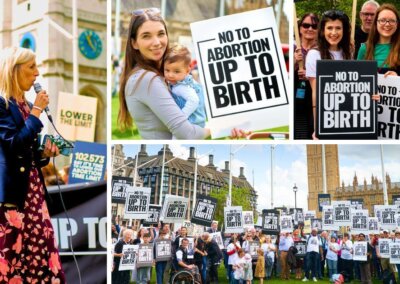Pro-life campaigners have made it clear that they will be fighting an extreme abortion up to birth amendment as it progresses to the House of Lords, after the Government’s Crime and Policing Bill was hijacked to rush through a seismic and unpopular change to abortion law after just two hours’ debate.
Yesterday, the extreme abortion amendment (NC1), tabled by Tonia Antoniazzi MP, was passed by MPs by a vote of 379 to 137.
This amendment, if it remains in the Bill and the Bill receives Royal Assent, will change the law so it will no longer be illegal for women to perform their own abortions for any reason, including sex-selective purposes, and at any point up to and during birth, likely leading to a significant increase in the number of women performing dangerous late-term abortions at home.
This will likely lead to the lives of many more women being endangered because of the risks involved with ‘DIY’ self-administered late-term abortions and also tragically lead to an increased number of viable babies’ lives being ended well beyond the 24-week abortion time limit and beyond the point at which they would be able to survive outside the womb.
Despite the claims of supporters of NC1, it remains rare for women to be investigated for illegal abortions. The recent small increase arises from the ‘pills by post’ scheme that makes it easier for women to acquire abortion pills late in pregnancy without an in-person gestational age check.
Removing any legal deterrent against women performing their own abortions up to birth will make this situation much worse and will enable abortion providers to cover-up the disastrous consequences of the pills by post scheme, for which they lobbied, despite warnings that have now sadly come true about the risks. For example, the case of Stuart Worby, who spiked a woman’s drink to cause the ending of the life of her unborn child at 15 weeks gestation using pills supplied by one of the UK’s largest abortion providers.
Polling published last year found that there is very little public support for this change in the law, with only 16% of the general population supporting such a change, and a majority opposed.
Supporters of NC1 claim that time limits would remain. However, the explanatory note to NC1 itself explicitly states that it would apply “at any gestation”. By amending the abortion law in this way, self-administered abortions would, de facto, become possible up to birth as women could mislead abortion providers about their gestational age. For example, as in the case of Carla Foster, who pretended to be 7 weeks pregnant but took pills at 32-34 weeks gestation, rendering time limits redundant for women performing their own abortions. In such circumstances, neither the woman nor the abortion provider, who does not need to verify gestational age via an in-person appointment because of the pills by post scheme, could be held accountable for a late-term abortion that occurred between our current 24-week time limit and birth.
NC1 does not outline any circumstances in which it would continue to be an offence for a woman to perform her own abortion, and would not exclude sex-selective abortions.
This is the first time this extreme abortion amendment has been debated in the House of Commons, and there has been no consultation with the public on this seismic law change.
Following the debate, a point of order was raised by Jerome Mayhew MP, where he outlined “we have made a major change to the abortion law, and that was on the basis of no evidence session, no committee stage scrutiny, just 46 minutes of backbench debate and a government minister wind-up who refused to take any interventions.”
There has also been a large backlash after Tonia Antoniazzi MP said in an interview last week that she was comfortable with women being able to abort a viable baby at 37 weeks.
These changes are not backed by the general public nor by women in particular. Polling shows that 89% of the general population and 91% of women agree that gender-selective abortion should be explicitly banned by the law – and only 1% of women support introducing abortion up to birth.
Dr Caroline Johnson’s proposed law change
Polling published this week shows widespread public support for the law change that had been proposed by Dr Caroline Johnson’s amendment (NC106), with two-thirds of women supporting the reinstatement of in-person appointments and only 4% in favour of the status quo.
The amendment (NC106) was signed by a cross-party group of over 40 MPs from six parties including former leader of the Conservative Party and cabinet minister Sir Iain Duncan Smith, Reform UK Deputy Leader Richard Tice, former Liberal Democrat leader Tim Farron, former health minister Neil O’Brien, Father of the House Sir Edward Leigh, chairman of the Conservative 1922 Committee Bob Blackman, former Labour Opposition Whip Mary Glindon and former Health and Social Care Select Committee member, and Labour shadow minister, Rachael Maskell.
This amendment was aimed at protecting women by ensuring they had an in-person consultation with a medical professional before they could take abortion pills at home. This would have allowed an accurate assessment, in person, of any likely health risks for a woman taking abortion pills, her gestational age and the possibility of a coerced abortion.
Women would have continued to be able to have a medical abortion at home, but with the vital safeguards that come with an in-person consultation.
Ahead of the vote, over 1,000 medical professionals called on MPs to oppose the two abortion up to birth amendments that have been tabled to the Government’s Crime and Policing Bill and to instead reinstate in-person consultations with a medical professional prior to an abortion taking place at home, as proposed by Dr Caroline Johnson’s amendment (NC106).
Unfortunately, the amendment tabled by Dr Caroline Johnson that would have reinstated in-person consultations to help protect women and babies from dangerous late-term home abortions did not pass.
Stella Creasy’s amendment
Labour MP Stella Creasy tabled an even more extreme amendment (NC20), which was ultimately not put to a vote. This amendment would have rendered the 24-week time limit set out in section 1(1)(a) of the Abortion Act 1967 obsolete, permitting abortion providers to perform abortions on demand, for any reason, including sex-selective purposes, at any stage, up to birth.
This effect of the amendment has been confirmed in a legal opinion by Stephen Rose KC, a leading criminal barrister, which was commissioned by Sir Edward Leigh, the Father of the House.
The Creasy amendment was so extreme that the UK’s largest abortion provider, and main campaigner for liberalising abortion laws, came out and publicly opposed the amendment after receiving its own legal opinion on the amendment.
In a briefing circulated to MPs, BPAS outlined that a legal opinion from another leading KC confirmed that NC20 would “largely render the Abortion Act 1967 obsolete” and “create a regulatory lacuna around abortion provision and access”.
NC20 would have repealed sections 58 and 59 of the Offences Against the Person Act (OAPA) and the Infant Life (Preservation) Act (ILPA).
As the Abortion Act 1967 was passed to create exemptions to sections 58 and 59 of the OAPA and the ILPA, repealing sections 58 and 59 of the OAPA and the ILPA would make key safeguards provided by the Abortion Act 1967, including the 24-week time limit, redundant throughout all nine months of pregnancy.
Although the amendment sought to amend the Abortion Act in order to maintain certain provisions within it, these provisions would not have had any remaining legal force or basis if the underlying laws to which the Abortion Act relates had been repealed.
In addition, subsection (9) of the amendment prevented any future government from using regulations to reintroduce the 24-week limit. Once removed, such limits could only be reinstated through new primary legislation.
The amendment would have also rendered the statutory grounds set out in section 1(1) of the Abortion Act 1967 obsolete. Sex-selective abortion would have become legal – women could have obtained, and abortion providers could have performed, abortions for sex-selective purposes at any stage of pregnancy up to birth.
NC20 would have also removed the legal safeguard for two doctors to certify an abortion and restrictions, designed to safeguard women, on where abortions could be performed. It would also mean there would be no legal deterrent against women performing their own abortions at home using abortion pills up to birth, beyond the current 10-week legal limit for at-home abortions. This would gravely endanger women’s health because of the increased risks associated with taking abortion pills without a prior in-person appointment after the current 10-week limit.
NC20 would also repeal Section 60 of the Offences Against the Person Act 1861, removing key deterrents against hiding the body of a dead baby. Section 60 makes it an offence to conceal the birth of a child by hiding the dead body of a child, after its birth, including in circumstances when the baby has been killed through infanticide. Section 60 is important in stopping individuals from preventing an investigation into the cause of a child’s death when infanticide is suspected. This could make it harder for police to investigate abortions that take place as a result of trafficking or abuse, since it would no longer be an offence for a woman or abortion provider, with the woman’s consent, to conceal or dispose of a dead baby after an abortion.
In-person consultations are essential
Since March 2022, the vital importance of in-person consultations has become clear.
In December of last year, Stuart Worby was jailed after inducing a woman to have an abortion against her will or knowledge, after spiking her drink with abortion pills obtained via a third party using the pills by post scheme. This tragic incident would not have been possible if in-person appointments had been required.
In June 2023, Carla Foster was found guilty of taking abortion pills prescribed by BPAS, Britain’s largest abortion provider, at 32-34 weeks gestation after admitting to lying about her gestational age and claiming to be 7 weeks pregnant. She described being traumatised by the face of her dead baby, whom she named Lily.
If Carla Foster had been given an in-person appointment at BPAS where her gestation could have been accurately determined, she would not have been able to obtain abortion pills and this tragic case would have been prevented.
The small recent increase in such prosecutions for illegal late-term abortions, ending the lives of viable babies, is a direct result of the ‘pills-by-post’ scheme that means women are able to obtain abortion pills without an in-person consultation to accurately assess their gestational age or possible health risks such as an ectopic pregnancy.
This has been acknowledged by pro-choice MPs and campaigners including Stella Creasy MP, abortion rights expert Dr Claire Pierson and major pro-choice leaning newspaper The Observer.
Clear solution is reinstatement of in-person consultations, not ‘decriminalising’ abortion
Decriminalising abortion will make matters worse by making it no longer illegal for women to perform their own abortions for any reason, including sex-selective abortions, and at any point up to and during birth, thus endangering their lives and likely leading to an increase in women using abortion pills to end their pregnancies at home after the 24-week abortion time limit, up to the point of birth.
Instead, NC106 would have given Parliament an opportunity to protect women and prevent these tragic cases from happening by restoring the vital safeguard of an in-person consultation with a medical professional.
Government review
A Government review published in November 2023 found the complication rate for medical abortions at 20 weeks and over is 160.33 times higher when compared to medical abortions that occurred at 2 to 9 weeks.
The complication rate for women who perform their own medical abortions outside of a clinical setting at 10 weeks or beyond in a home abortion is likely to be even higher than the rates when an abortion is happening in a clinical setting.
Such complications are far more likely without an in-person appointment where there is an opportunity to accurately assess gestation age, and would be even more likely if the current legal deterrent against late-term abortions was removed.
History of at-home abortion schemes
Telemedicine home abortions were originally introduced in March 2020 as a temporary measure during the pandemic.
In February 2022, the Government announced the scheme would end after running a consultation in which 70% of respondents called for an immediate end to at-home abortion schemes.
However, at-home abortion schemes were made permanently available via a backbench amendment moved in the House of Lords to the Health and Care Act in March 2022, which narrowly passed by just 27 votes in the Commons.
Given the major issues with at-home abortion schemes and the high-profile cases of women using the scheme to abort later in pregnancy, pro-choice MPs will be facing a big battle to prevent this amendment from passing and stop their own amendments from failing, as MPs see that the solution to the major problems with these schemes is in-person appointments, not making them worse by removing key deterrents against performing an abortion at any point right through to birth.
Our abortion law is already extreme
In most European Union (EU) countries, abortion is only legal on demand or on broad social grounds up to 12 weeks gestation, making legislation in the United Kingdom double the average among EU countries.
When compared to almost every European Union country, it is clear that the United Kingdom is an outlier.
Among the 27 countries that are member states of the European Union, three have a time limit for abortion on demand or on broad social grounds at 10 weeks, one country at 11 weeks, 15 countries at 12 weeks, 3 countries at 14 weeks and two countries only allow abortion in very limited circumstances.
Countries with 12-week limits for abortion on demand or on broad social grounds include Germany, Italy and Belgium as well as the more “liberal” Nordic countries Denmark and Finland. Even Sweden has a time limit for abortion on demand or on broad social grounds that is much lower than the United Kingdom at 18 weeks.
Lord Alton of Liverpool said “This hasty change will have profound implications for the way that longstanding law in this country will operate. We know that there are potential real risks for the safety of women in particular who will be encouraged towards DIY abortions. I expect that colleagues in the House of Lords will wish to scrutinise its provisions very closely and to amend it as necessary to make it safe.“
Spokesperson for Right To Life UK, Catherine Robinson, said “Pro-abortion MPs have hijacked a government Bill to rush through this radical and seismic change to our abortion laws after just two hours of debate.”
“This is the first time this extreme abortion amendment has been debated in the House of Commons, and there has been no consultation with the public on this seismic law change.”
“We will be fighting this amendment at every stage in the Lords.”
“Tonia Antoniazzi’s amendment would change the law so it would no longer be illegal for women to perform their own abortions for any reason, and at any point up to and during birth, likely leading to a significant increase in the number of women performing dangerous late-term abortions at home.”
“This law change would likely lead to the lives of many more women being endangered because of the risks involved with self-administered late-term abortions and also tragically lead to an increased number of viable babies’ lives being ended well beyond the 24-week abortion time limit and beyond the point at which they would be able to survive outside the womb.”
“This change to the law is not backed by the general public nor by women in particular. Polling shows that 89% of the general population and 91% of women agree that gender-selective abortion should be explicitly banned by the law, and only 1% of women support introducing abortion up to birth.”
“The abortion lobby is pushing to decriminalise abortion to cover up the disastrous effects of its irresponsible pills by post scheme, which endangers women by removing the requirement for in-person consultations to reliably verify a woman’s gestational age and assess any health risks or the risk of coercion before abortion pills may be prescribed.”
“The solution is clear. We urgently need to reinstate in-person appointments. This simple safeguard would prevent women’s lives from being put at risk from self-administered late-term abortions, a danger that would be exacerbated if abortion were ‘decriminalised’ right up to birth.”











